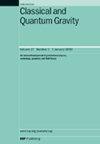引力波探测器中机器学习辅助低延迟噪声回归演示
IF 3.6
3区 物理与天体物理
Q2 ASTRONOMY & ASTROPHYSICS
引用次数: 0
摘要
低延迟噪声回归算法对于最大限度地提高 LIGO、Virgo 和 KAGRA 引力波探测器的科学成果至关重要。这包括提高信号的可探测性、源定位和合并前可探测性,从而实现快速的多信使跟踪。在本文中,我们展示了 DeepClean 的有效性,这是一种卷积神经网络架构,利用见证传感器来估计和减去引力波应变数据中的非线性和非稳态噪声。我们的研究使用了 LIGO 第三次观测运行的数据,其中注入了紧凑二进制信号。作为演示,我们使用 DeepClean 来减去 60 Hz 频率的噪声,这些噪声是由电源及其与其他仪器噪声源的非线性耦合产生的边带引起的。我们对注入信号的参数估计研究表明,DeepClean 不会对数据中的潜在天体物理信号造成任何损害,同时还能提高潜在信号的信噪比。我们的研究表明,DeepClean 可用于低延迟噪声回归,在 ~1-2 秒的延迟时间内生成经过净化的输出数据。我们还讨论了在为低延迟应用训练 DeepClean 时可能需要考虑的各种因素。本文章由计算机程序翻译,如有差异,请以英文原文为准。
Demonstration of machine learning-assisted low-latency noise regression in gravitational wave detectors
Low-latency noise regression algorithms are crucial for maximizing the science outcomes of the LIGO, Virgo, and KAGRA gravitational-wave detectors. This includes improvements in the detectability, source localization and pre-merger detectability of signals thereby enabling rapid multi-messenger follow-up. In this paper, we demonstrate the effectiveness of DeepClean, a convolutional neural network architecture that uses witness sensors to estimate and subtract non-linear and non-stationary noise from gravitational-wave strain data. Our study uses LIGO data from the third observing run with injected compact binary signals. As a demonstration, we use DeepClean to subtract the noise at 60 Hz due to the power mains and their sidebands arising from non-linear coupling with other instrumental noise sources. Our parameter estimation study on the injected signals shows that DeepClean does not do any harm to the underlying astrophysical signals in the data while it can enhance the signal-to-noise ratio of potential signals. We show that DeepClean can be used for low-latency noise regression to produce cleaned output data at latencies ~1–2 s. We also discuss various considerations that may be made while training DeepClean for low latency applications.
求助全文
通过发布文献求助,成功后即可免费获取论文全文。
去求助
来源期刊

Classical and Quantum Gravity
物理-天文与天体物理
CiteScore
7.00
自引率
8.60%
发文量
301
审稿时长
2-4 weeks
期刊介绍:
Classical and Quantum Gravity is an established journal for physicists, mathematicians and cosmologists in the fields of gravitation and the theory of spacetime. The journal is now the acknowledged world leader in classical relativity and all areas of quantum gravity.
 求助内容:
求助内容: 应助结果提醒方式:
应助结果提醒方式:


